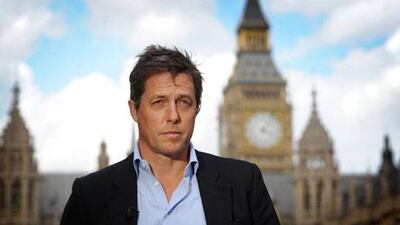There have been plenty of moments to beggar belief in the maelstrom that is the UK press phone-hacking scandal: the closure of Britain's best-selling newspaper; News of the World, the resignations of high-profile police chiefs; a shaving foam pie in Rupert Murdoch's face in the Palace of Westminster. But when the popular BBC radio station Five Live announced that the next caller to pontificate on the crisis would be Hugh Grant - yes, that Hugh Grant - we truly were in uncharted territory.
What came next, though, was almost incredible. Not only did Grant turn out to be some sort of expert on press regulation, he swiftly became the go-to man for anyone wanting a sympathetic quote on phone hacking. Within days he'd appeared on the prime-time BBC current affairs show Newsnight and had stolen the show on the leading television debate programme Question Time. An actor regularly derided as a one-trick pony, and for portraying British men as nothing more than bumbling posh blokes, was, all of a sudden, the articulate voice of a people disgusted with everything the tabloid press stood for.
Of course, Grant had an axe to grind. The tabloids had made his life particularly uncomfortable when he was caught with the Hollywood prostitute Divine Brown. But he had also won substantial damages on two occasions for libel, on the latter occasion saying: "I'm also hoping that this statement in court might remind people that the so-called 'close friends' or 'close sources' on which these stories claim to be based almost never exist."
Alas for Grant, such victories barely changed the view of him as a slightly whiney celebrity who didn't mind courting the press when there was a film out, but wasn't too keen on anything that didn't portray him in the most positive of lights. So how did we reach the point where, during a few extraordinary hours on Twitter recently, the actor was touted as prime minister material? The remarkable story begins on the side of a country road in the south-east UK county of Kent in December.
Grant's car had broken down. He was angry, not least because the man who had stopped to help started taking pictures of him with a long-lens camera. This wasn't any old opportunist member of the public, but, completely coincidentally, Paul McMullan, one of the News of the World reporters who had previously revealed (in newspapers and on television) the culture of phone-hacking at the paper under its former editor Andy Coulson. McMullan now ran a pub - and as he drove Grant back to civilisation, he admitted that the actor had once been a target.
It didn't surprise Grant that, come the following Sunday, McMullan had sold his story of Grant's automotive woes to the Mail on Sunday, but the pair remained amicable enough, and Grant took him up on his offer to drop into his pub for a drink some time. Except, this time Grant secretly taped their conversation - "the bugger bugged", as he succinctly put it in the New Statesman story that ran this April and printed their entire conversation.
It made for sobering reading and was, essentially, the first inkling that the hacking involved targeting the families involved in high-profile child-murder cases rather than, well, trying to find out whom Hugh Grant was dating. As McMullan said, the practice "was quite routine".
The story had more than half a million hits but it took confirmation in The Guardian - two weeks ago - that murdered Milly Dowler's phone had indeed been tapped for the public mood to change.
At which point, you could have forgiven Grant for affecting an air of unbelievable smugness. He had been right all along. But to his great credit, his subsequent appearances on virtually every current affairs show that would have him have not been exercises in "I told you so". Instead, he made sure the focus remained firmly on the wrongdoers and, on Question Time, praised "the tenacity of The Guardian and a few individuals who had the guts to take on an intimidating organisation".
Heads have rolled. Acts will have to be cleaned up. But one of the most fascinating by-products of the phone-hacking scandal is the insight it gives us into the UK's relationship with celebrities in 2011. The British public knew that Sienna Millar's phone had been tapped - not least because News International settled for £100,000 (Dh599,000) in damages in June. That didn't provoke a sense of outrage or calls for the News of the World to be shut. The methods might have been underhand, but celebrities were, seemingly, fair game. The romantic entanglements of actors such as Steve Coogan were discussed around the watercooler on a Monday morning - whether they were true or not.
Hugh Grant, then, has achieved a lot. But he has got a long way to go before he changes a celebrity-obsessed society for good.

